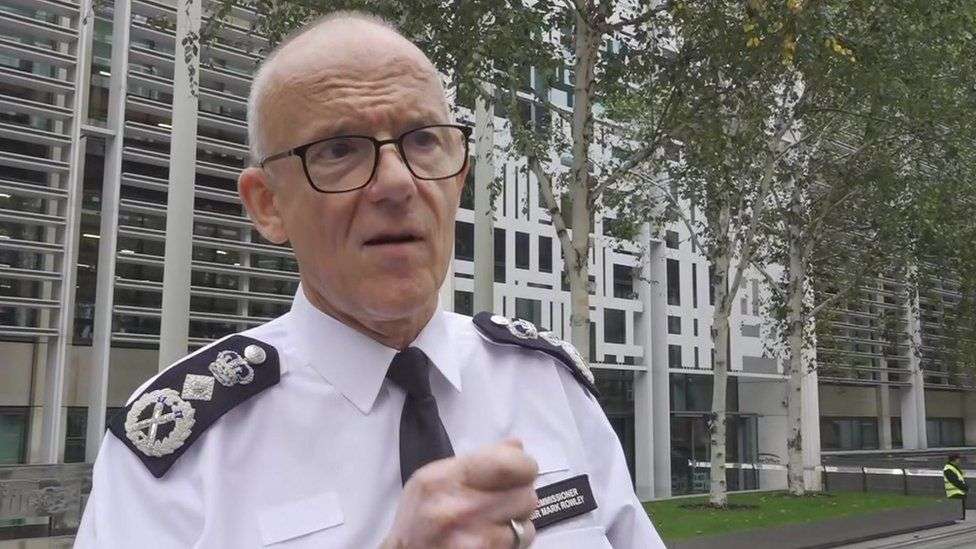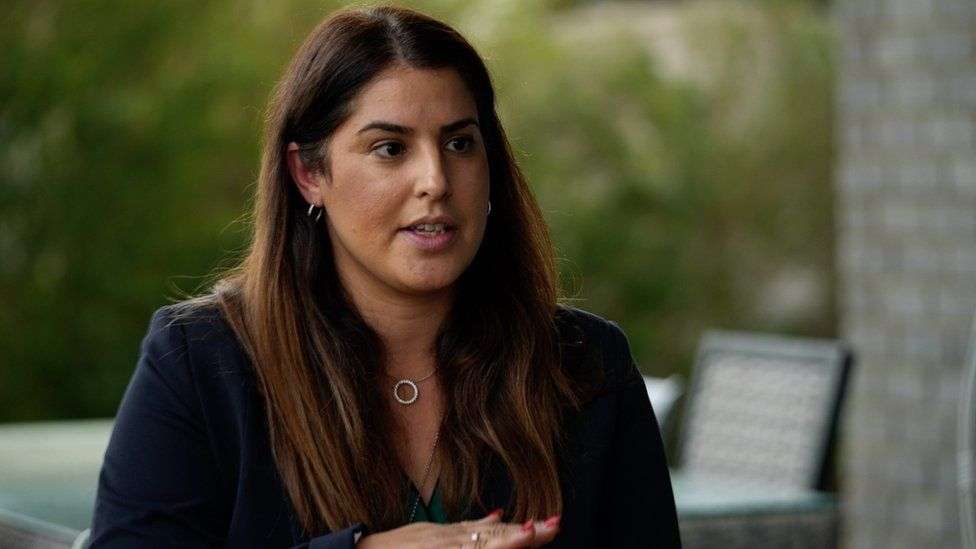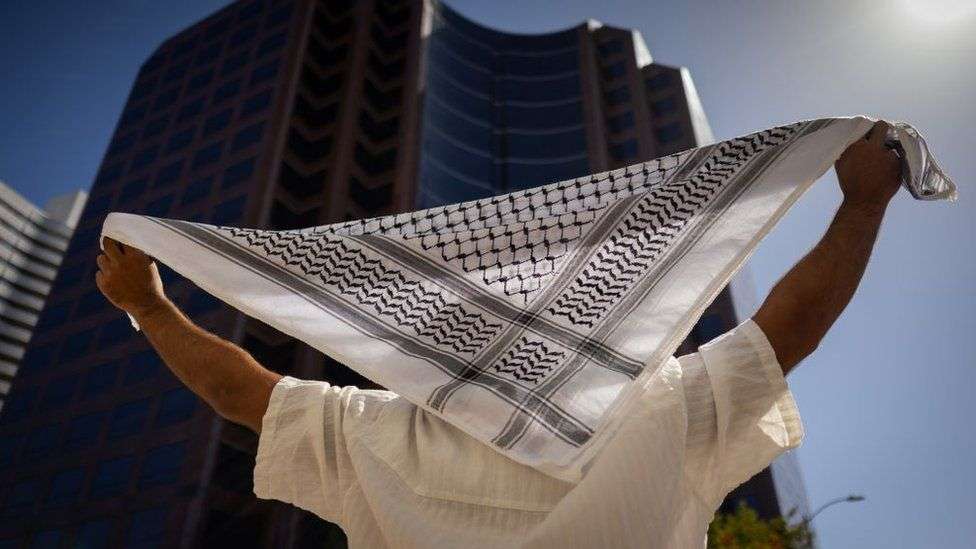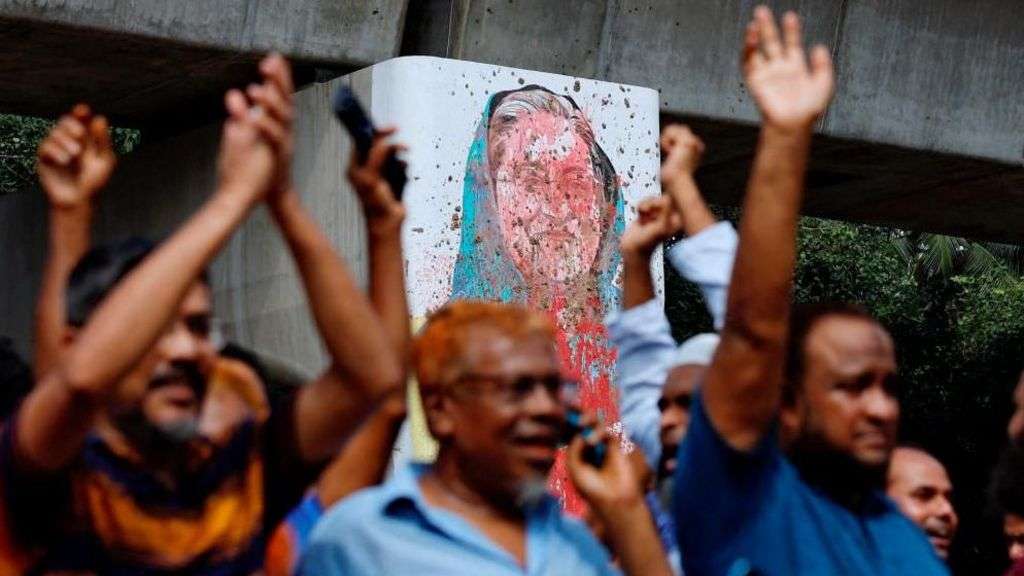Metropolitan Police chief Sir Mark Rowley has said hate crime laws "probably need redrawing" as he faced questions about the policing of a pro-Palestinian rally in London.
A video posted online appeared to show a man shouting "jihad" at a separate event from the main march.
Having reviewed the clip, the Met said they had not identified any offences.
Sir Mark said police were "ruthless in in tackling anybody who puts their foot over the legal line".
But he added: "Our job is to enforce to that line, Parliament's job is to draw that line - maybe some of the lines aren't in the right place."
Downing Street said there were "no plans" to give police more powers to deal with chants deemed to be extremist.
But Sir Mark said he had raised the issue with Home Secretary Suella Braverman earlier, during a meeting to discuss antisemitic incidents in the UK since Hamas's attack on Israel.
Sources said before the meeting that the home secretary was keen to quiz him about the Met's response to the rally over the weekend.
The Home Office said Ms Braverman "recognised the complexities of the law in policing aspects of these protests and prosecutor decisions".
The government will ensure the police "have everything they need to maintain law and order," the department added after the meeting.
Arrests
Sir Mark said that some of the scenes in London over the weekend would have been "incredibly distressing for people to witness, not least to the UK's Jewish community who deserve to feel safe at what must be an incredibly traumatic time".
He added that the government "believe the police have extensive powers in this space" but senior officers and minister would continue to hold discussions to ensure "clarity".
The Met estimated that up to 100,000 people gathered in central London on Saturday to show solidarity with Palestinian civilians.
More than 1,000 officers were involved in policing the demonstration near Downing Street. Sir Mark said 34 arrests had been made so far.
The Met said arrests made during Saturday's march were linked to possession of fireworks, public order and assaulting an emergency service worker.
But, the force said on Sunday it was taking no further action after footage appeared online of a man chanting "jihad, jihad" at the smaller rally staged by the Islamist group Hizb ut-Tahrir, which was close to the main march.
A statement from the force said the word jihad had "a number of meanings but we know the public will most commonly associate it with terrorism".
It said it "had not identified any offences arising from the specific clip", and specialist lawyers at the Crown Prosecution Service had reached the same conclusion.
"However, recognising the way language like this will be interpreted by the public and the divisive impact it will have, officers identified the man involved and spoke to him to discourage any repeat of similar chanting," the force added.
It also said no further action would be taken after it reviewed photographs of protesters holding banners referring to "Muslim armies".
"Jihad" literally means "effort" or "struggle" in Arabic. In Islam the main meaning is an internal struggle, such as a believer's struggle to live in accordance with their faith. Jihad can also be an outward struggle or war, which in Islamic teaching must be in self defence and within prescribed limits.
Home Office Minister Robert Jenrick said he believed the chant amounted to "inciting terrorist violence" and needed to be "tackled with the full force of the law".
On Sunday, he told Sky News: "Chanting 'jihad' on the streets of London is completely reprehensible and I never want to see scenes like that."
But, the minister admitted it was an "operational matter" for the police and the Crown Prosecution Service (CPS) whether to press charges.
However, questions have been asked about whether the current laws are sufficient.
Labour leader Sir Keir Starmer said the government needed to look at whether there were "gaps in the law".
He also said there had been a "huge" increase in hate crimes in recent weeks, adding: "We've all got a duty to take action to clamp down on hate crime whatever political party we are in."
Political pressure
In 2021, before he became the Met commissioner, Sir Mark co-authored a report warning that there was a "gaping chasm" in terror laws allowing extremists to act with "impunity".
The report argued that material praising Adolf Hitler, supporting Osama bin Laden and denying the Holocaust was all legal as long as it did not directly encourage violence.
"Current legal boundaries allow extremists to operate with impunity," Mr Rowley said then. "The current situation is simply untenable."
Under the Public Order Act, the offence of inciting violence is one that is directed at another person. Meanwhile, the offence of "encouragement of terrorism" under the Terrorism Act requires prosecutors to show that somebody was encouraging people to "commit, prepare or instigate acts of terrorism".
Sara Khan, who wrote the report with Sir Mark, told the OceanNewsUK's Today programme "the nature and scale of extremist activity that is currently lawful in this country" was "really shocking".
Following the protests over the weekend, there may be political pressure on the government to tighten up the laws, and ban the Hizb ut-Tahrir group in the UK.
Hizb ut-Tahrir's status has been a subject of political controversy for decades.
Former Prime Minister Tony Blair said he would ban the group shortly after the 7/7 bombings in 2005 as part of a plan to combat Islamist extremism.
But he dropped the plan following resistance from the Home Office and senior police officers, who believed pressing ahead would boost the group's recruitment.
David Cameron then vowed to ban the group when he was Conservative leader but after entering government also abandoned the proposal.








